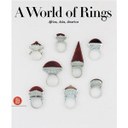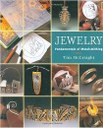Books
Technical, inspirational and theoretical books about jewelry, metalsmithing and craft
- A World of Rings
- The first book of the series A World of Rings presents over 1,000 rings from three continents. Round, square, oval, hexagonal or simply a sculpture in space, since ancient times the ring has lent itself to the boundless imagination of its creators in a fascinating variety of ways.
- Complete Metalsmith: Student Edition
- Students, hobbyists, and others just getting started in metalworking have turned to this informative, easy-access reference time and time again. Without getting bogged down in confusing details, it teaches them what they need to know about the most effective techniques for working with gold, platinum, copper, brass, steel, plaster, and more. In fact, it covers most of the same subjects as the professional version, only in a simpler fashion: metals, tools, surfaces, shaping, joining, casting, stones, and mechanisms. And, like the larger edition, it has a spiral spine and attractive color images throughout. Newcomers to the field will especially appreciate the safety tips and the many charts covering melting points, conversion, factors, and other fundamental knowledge.
- Jewelry: Fundamentals of Metalsmithing
- A professional metalsmith and teacher well known as the author of a standard text, The Complete Metalsmith (Davis, 1991. rev. ed.), McCreight offers a lavishly illustrated guide to techniques. As indicated by the title, this book covers metalworking fundamentals.
- The Craftsman
- With this volume, author and sociologist Sennett, launches a three-book examination of "material culture," asking "what the process of making concrete things reveals to us about ourselves." Sennett looks at the evolution of craftsmanship and the historical forces which have stultified it, how it's learned in the areas it still thrives (among scientists, artists, cooks, computer programmers and others), and issues of quality and ability (skill, not talent, makes a craftsman). Sennett's learned but inclusive prose proves entirely readable, and the breadth of his curiosity-delving into the minds behind the Manhattan project, touring Soviet suburbs, examining the methods of Julia Childs-take him in a number of fascinating directions.




